| Los Padres National Forest | |
|---|---|
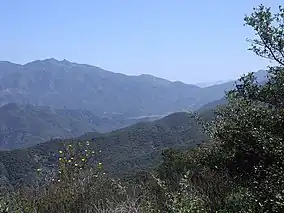 Jameson Reservoir (center), Santa Ynez Mountains (right), Los Padres back country and Old Man Mountain (left), Reyes Peak (background). | |
| Location | California |
| Nearest city | Santa Barbara, Big Sur, Ojai, San Luis Obispo, Solvang and Santa Ynez[1] |
| Coordinates | 34°40′N 119°45′W / 34.667°N 119.750°W |
| Area | 2,970 sq mi (7,700 km2) |
| Established | December 1936 |
| Governing body | U.S. Forest Service |
| Website | Los Padres National Forest |
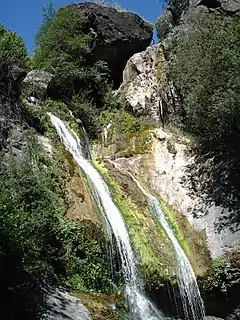
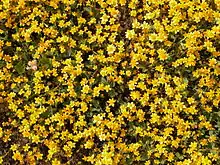
Los Padres National Forest is a United States national forest in southern and central California. Administered by the United States Forest Service, Los Padres includes most of the mountainous land along the California coast from Ventura to Monterey, extending inland. Elevations range from sea level to 8,847 feet (2,697 m).[2]
Geography
The forest is approximately 1,950,000 acres (7,890 km2) in area, of which 1,762,400 acres (7,130 km2) or about 88% are public lands; the rest are privately owned inholdings.[3]
The forest is divided into two non-contiguous areas separated approximately 40 to 50 miles (64 to 80 km) from one another. The northern division lies within Monterey County and includes the Big Sur Coast and its scenic interior areas. This is a very popular area for hiking, with 323 miles (520 km) of hiking trails and 11 campgrounds (ranging from very rugged to suitable for recreational vehicles).[4]
The larger, so called main section of Los Padres lies further south, within San Luis Obispo, Santa Barbara, Ventura and Kern Counties, with a small extension into Los Angeles County in the Pyramid Lake area, between Castaic and Gorman. The Santa Ynez Mountains, which are within the Los Padres, rise above the Gaviota Coast, a series of alluvial plains along the last undeveloped stretch of the Southern California coastline. Other mountain ranges within the Los Padres include the Santa Lucia Mountains, La Panza Range, Caliente Range (a small part), Sierra Madre Mountains, San Rafael Mountains, and Topatopa Mountains; the highest parts of the forest are not within named mountain ranges, but are adjacent to the western San Emigdio Mountains and include Mount Pinos, Cerro Noroeste, and Reyes Peak. The forest is also adjacent to the Angeles National Forest, which is in Los Angeles County in Southern California and is nearby Carrizo Plain National Monument in eastern San Luis Obispo County. Forest headquarters are located in Goleta, California. There are local ranger district offices in Frazier Park, King City, Ojai, Santa Barbara, and Santa Maria.[5]
Many rivers in Southern and Central California have their points of origin within the Los Padres National Forest, including the Carmel, Salinas, Cuyama, Sisquoc, Santa Ynez, Coyote Creek, Sespe, Ventura, and Piru.
Several wilderness areas have been set aside within the Los Padres National Forest, including the San Rafael Wilderness, the first primitive area to be included in the U.S. wilderness system after the passage of the Wilderness Act in 1964. Another large wilderness created in the 1970s was the Ventana Wilderness in the Santa Lucia Mountains. The Los Padres Condor Range and River Protection Act of 1992 expanded existing wilderness by 84,400 acres (34,200 ha) and designated 316,050 acres (127,900 ha) of new wilderness that provides habitat for the condor. A total of 48% of the total area within the forest has a wilderness designation.[1]
Wilderness areas
- San Rafael Wilderness (194,380 acres (787 km2))
- Ventana Wilderness (240,026 acres (971 km2))
- Garcia Wilderness (14,100 acres (57 km2) in the Lucia District)
- Santa Lucia Wilderness (20,412 acres (83 km2) in the Lucia District, in the Santa Lucia Mountains)
- Machesna Mountain Wilderness (19,880 acres (80 km2), in the La Panza Range in San Luis Obispo County)
- Silver Peak Wilderness (31,555 acres (128 km2), in the Monterey District)
- Dick Smith Wilderness (64,800 acres (262 km2) in the Santa Barbara Ranger District)
- Chumash Wilderness (38,150 acres (154 km2) in the Mt. Pinos Ranger District, just west of Mount Pinos)
- Sespe Wilderness (219,700 acres (889 km2), in both the Ojai and Mt. Pinos Ranger Districts)
- Matilija Wilderness (29,600 acres (120 km2) in the Ojai Ranger District)
Recreation areas
Parts of the National Forest are designated as recreation areas. There are three recreation areas,[6]
- Figueroa Mountain Recreation Area
- Sage Hill Group Recreation Area
- Santa Ynez Recreation Area, in the Santa Barbara Ranger District.
Wildlife and vegetation

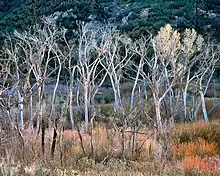
Many threatened and endangered species live within the forest. Among them is the California condor (Gymnogyps californianus), for whom the United States Forest Service manages the Sespe Condor Sanctuary and the Sisquoc Condor Sanctuary.[7] Also present is the California mountain kingsnake, a California species of special concern. The American peregrine falcon is also entirely dependent on the forest for its survival. The mountain lion and California mule deer may be the most common large mammals. Bighorn sheep inhabit the Sespe Creek region of the forest.[8] American black bears browse on grasses, berries, and carrion.[9] Coyotes thrive everywhere in this forest. Bobcats can occasionally be seen in the more remote mountainous areas of the forest. Other animals found in this forest are raccoons, bluebirds, barn owls, red-tailed hawks, cottontail rabbits, bald eagles, jack rabbits, California quail, California scrub jays, and great horned owls.[10]
Many vegetation types are represented in the Los Padres, including chaparral, the common ground cover of most coastal ranges in California below about 5,000 feet (1,500 m), and coniferous forests, which can be found in abundance in the Ventana Wilderness as well as the region around Mount Pinos in northern Ventura County.
Researchers estimate the extent of old growth in the forest is 18,900 acres (76 km2). It consists largely of Jeffrey pine (Pinus jeffreyi) forests, although old-growth coast redwood (Sequoia Sempervirens), coast Douglas-fir (Pseudotsuga menziesii var. menziesii), and white fir (Abies concolor) are also found there.[11] In 2008, scientist J. Michael Fay published a map of old growth redwoods in and around Big Sur as a result of his transect of the entire redwood range.[12]
Resource extraction and fire prevention
The U.S. Forest Service decided in May 2020 to thin 755 acres (306 ha) of land to reduce wildfire risk most of which is within the national forest. The decision memo states the project aims to “to improve forest health by reducing mortality risk, provide safe and effective locations from which to perform fire suppression operations, to slow the spread of a wildland fire”.[13] The Reyes Peak Forest Health and Fuels Reduction Project is roughly 30 miles (48 km) north of Ojai in the Reyes Peak area on Pine Mountain in Ventura County. Seven environmental groups, the city of Ojai and Ventura County filed three lawsuits in federal court in April 2022 to stop the brush clearance and logging operation.[14][15] The suit was dismissed with prejudice on July 19, 2023 by a federal judge.[16]
Access
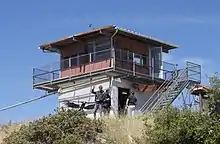
Due to the fire risk, there are seasonal restrictions on building fires. Some portions of the forest are closed entirely to public entry during the peak fire season, which usually extends from around June 1 to mid-November.
A National Forest Adventure Pass is required for parking in most locations of the Los Padres National Forest, as well as other National Forests in Southern California. The pass is not required in the Monterey Ranger District including Ventana Wilderness and Silver Peak Wilderness.
Restrictions were put in place at times during the COVID-19 pandemic due to crowded conditions in which people were unable to social distance and also the resulting litter and human waste that was left behind.[17]
History

Los Padres means "the Fathers", referring to the Catholic missionary priests of the Spanish missions who proselytized in and around the area in the 18th and 19th centuries.[18]
Los Padres was named Santa Barbara National Forest until December 3, 1936, and was assembled from a number of smaller National Forests, including:[19]
- Monterey National Forest (est. June 25, 1906), absorbed by Santa Barbara on August 18, 1919, and which itself had absorbed:
- Pinnacles National Forest (est. July 18, 1906)
- San Benito National Forest (est. October 26, 1907)
- San Luis National Forest (est. July 1, 1908), which had absorbed part of:
- San Luis Obispo National Forest (est. June 25, 1906)
- San Gabriel National Forest (part) (est. December 20, 1892)
- Pine Mountain and Zaka Lake Forest Reserve, (est. March 2, 1898) combined with Santa Ynez on December 22, 1903, to create Santa Barbara Forest Reserve
- Santa Ynez Forest Reserve, (est. October 2, 1899)
After the consolidation of the forests, the name Santa Barbara Forest was resented by residents of the other counties for being too closely identified with just the one county. Amidst public pressure, administrators therefore changed the name to Los Padres to be more representative of the regional history.[18]
Fires
Due to the very dry summers, forest fires in Los Padres National Forest are always a risk. In 1965, a truck driven by country singer Johnny Cash caught fire, and burned several hundred acres in Ventura county.[20] In August 1977, the Marble Cone Fire burned 178,000 acres (720 km2)[21] within the Ventana Wilderness and other portions of the Los Padres Forest. In June and July, 2008, the Basin Complex Fire torched 162,818 acres (658.90 km2)[22] in the same region.
The Thomas Fire was a massive wildfire that traversed the forest within Ventura and Santa Barbara Counties. It was one of multiple wildfires that ignited in southern California in December 2017. The unusually strong and persistent Santa Ana winds were the largest factor in the spread of the fire. The region experienced an on-and-off Santa Ana wind event for a little over two weeks, which contributed to the Thomas Fire's persistent growths in size.[23] At its height, the wildfire was powerful enough to generate its own weather, qualifying it as a firestorm.
The Forest Service conducts prescribed burns when favorable weather conditions are present; temperatures must be below 80 degrees, winds lower than 15 miles per hour and relative humidity needs to be above 20 percent.[24]
Marijuana grows
Illegal farming of cannabis in secluded areas has been a problem for a long time in the forest. The practice continues under legalization as the crops are produced for the unregulated market without testing for the illegal pesticides they may be contaminated with. These operations often use pesticides and leave piles of trash such as drip irrigation tubing.[25][26][27][28]
See also
References
- 1 2 Los Padres National Forest: Recreation and Visitors Maps
- ↑ "Mount Pinos". NGS Data Sheet. National Geodetic Survey, National Oceanic and Atmospheric Administration, United States Department of Commerce. Retrieved June 29, 2009.
- ↑ Meyers, Jeff (June 6, 1993). "People of the Forest : Los Padres: In privately owned pockets within the territory, solitude seekers live on the land, far from the madding crowds". Los Angeles Times. Retrieved May 3, 2023.
- ↑ SeeMonterey: Los Padres National Forest
- ↑ USFS Ranger Districts by State
- ↑ "Los Padres National Forest". Great Outdoor Recreation Pages. Archived from the original on November 4, 2013. Retrieved November 3, 2013.
- ↑ "Los Padres National Forest". National Forest Foundation. Retrieved July 10, 2023.
- ↑ Graham, Chuck (May 15, 2014) "Expanding their range: A story of survival of the desert bighorn sheep in the county's Sespe Wilderness" Ventura County Reporter
- ↑ "Black Bear Population Information". California Department of Fish and Wildlife. Retrieved March 29, 2019.
- ↑ Orozco, Lance (November 18, 2019). "Los Padres National Forest Gets Land Donation; 800 Acres On Central Coast". KCLU News. Retrieved November 21, 2019.
- ↑ Warbington, Ralph; Beardsley, Debby (2002), 2002 Estimates of Old Growth Forests on the 18 National Forests of the Pacific Southwest Region, United States Forest Service, Pacific Southwest Region
- ↑ Fay, J. Michael (September 30, 2008), Redwood Transect-Big Sur Redwoods 2.0, retrieved January 6, 2009
- ↑ Aron, Hillel (April 27, 2022). "Forest 'thinning' project on Pine Mountain in Ventura County challenged". Courthouse News Service. Retrieved April 28, 2022.
- ↑ Orozco, Lance (April 27, 2022). "Environmentalists, government agencies rally against logging operation in Los Padres National Forest". KCLU. Retrieved April 28, 2022.
- ↑ Staff, Indy (May 1, 2023). "New Study Questions Forest Service Wildfire Management Strategies". The Santa Barbara Independent. Retrieved May 3, 2023.
- ↑ Martinez, Christian (July 27, 2023). "Forest thinning on Pine Mountain can move forward after Patagonia, Ventura County lawsuit dismissed". Los Angeles Times. Retrieved July 27, 2023.
- ↑ Money, Luke (August 3, 2020). "Ventura County trails to remain closed through September amid coronavirus concerns". Los Angeles Times. Retrieved August 4, 2020.
- 1 2 Brown, William S. (1945). History of Los Padres National Forest (PDF). San Francisco: Forest Service. p. 38.
- ↑ Davis, Richard C. (September 29, 2005), National Forests of the United States (PDF), The Forest History Society, archived from the original (PDF) on October 28, 2012
- ↑ Johnson, Brett (November 18, 2007). "Johnny Cash's first wife tells of romance, heartbreak — They walked the line". Ventura County Star. Archived from the original on February 28, 2009. Retrieved June 1, 2014.
- ↑ "Sequential Changes in Bed Habitat Conditions in the Upper Carmel River Following the Marble-Cone Fire of August, 1977", California Digital Library
- ↑ "Top 20 Largest California Wildfires" (PDF). CAL FIRE. Retrieved August 14, 2015.
- ↑ Joe Mozingo (December 31, 2017). "California's largest ever fire was a force that could not be stopped". Los Angeles Times. Retrieved December 31, 2017.
- ↑ Alley, Dave (February 12, 2019). "Prescribed burns planned for parts of Los Padres National Forest". KEYT. Retrieved May 20, 2019.
- ↑ Carlson, Cheri (June 18, 2019). "Sheep, foxes, bears found dead after marijuana raids in Los Padres, other state forests". Ventura County Star. Retrieved June 21, 2019.
- ↑ de los Santos, Senerey (June 27, 2019). "Illegal pot farm cleanup in Los Padres National Forest to take place this summer". KEYT. Retrieved June 27, 2019.
- ↑ Wenner, Gretchen (October 27, 2020). "Nearly 75,000 marijuana plants seized from illegal grows in Los Padres National Forest". Ventura County Star. Retrieved October 29, 2020.
- ↑ "Authorities Remove 3,000 Pounds of Trash From Los Padres National Forest". NBC Bay Area. Bay City News. December 19, 2020. Retrieved December 20, 2020.
External links
- Los Padres National Forest: US Forest Service official site
- Los Padres ForestWatch - a nonprofit organization working to protect and restore the natural and cultural heritage of the Los Padres National Forest
- Ventana Wilderness Alliance- dedicated to the preservation of wilderness areas and other public lands in the Monterey Ranger District of the Los Padres National Forest
- Mountain Biking in the Los Padres National Forest- a website with maps, descriptions & links of various routes through the forest for wilderness camping on a mountain bike.
